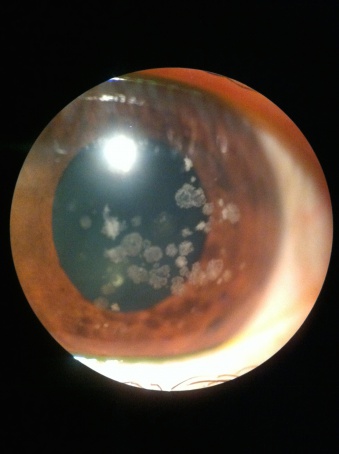Stromal Corneal Dystrophy (SCD) is a rare genetic disorder that affects the cornea, which is the clear outer layer of the eye. It is characterized by the buildup of abnormal material within the corneal stroma, which is the middle layer of the cornea. This can lead to various eye-related symptoms such as decreased vision, corneal haze, and recurrent corneal erosions.
SCD is a genetic disorder, which means it is caused by mutations in one or more genes. The specific genes involved in SCD vary depending on the subtype of the disease. SCD is an autosomal dominant disorder, which means that a person only needs to inherit one copy of the mutated gene from one parent to develop the disease. If one parent has the mutated gene, there is a 50% chance that each of their children will inherit the gene and develop the disease.
The symptoms of SCD can vary depending on the subtype of the disease and the extent of corneal involvement. The most common symptoms of SCD include decreased vision, corneal haze, recurrent corneal erosions, photophobia (sensitivity to light), foreign body sensation and blurred vision or loss of vision
In some cases, SCD may be asymptomatic, which means that the patient may not experience any symptoms.
The diagnosis of SCD is made based on the presence of characteristic symptoms, a detailed medical history, and physical examination. The doctor may also perform various tests such as a corneal examination, a corneal biopsy, and genetic testing to confirm the diagnosis and determine the subtype of the disease.
The treatment of SCD depends on the severity of symptoms and the extent of corneal involvement. There is no cure for SCD, but treatment can help manage the symptoms and prevent further damage to the cornea. The treatment may include:
- Lubricating eye drops: These drops may be used to relieve dryness and foreign body sensation in the eyes.
- Soft contact lenses: These lenses may be used to improve vision and reduce corneal erosions.
- Phototherapeutic keratectomy (PTK): This is a surgical procedure that uses a laser to remove the abnormal material from the cornea.
- Corneal transplant: In some cases, a corneal transplant may be necessary to replace the damaged cornea with a healthy one.
The prognosis for SCD varies depending on the subtype of the disease and the extent of corneal involvement. Early diagnosis and treatment can help manage the symptoms and prevent further damage to the cornea. However, in some cases, the disease may progress despite treatment, leading to permanent vision loss and other complications.
To conclude, Stromal Corneal Dystrophy is a rare genetic disorder that affects the cornea and can cause various eye-related symptoms such as decreased vision, corneal haze, and recurrent corneal erosions. It is important to seek prompt medical attention if you experience any of these symptoms, as early diagnosis and treatment can help manage the symptoms and prevent further damage to the cornea. If you have been diagnosed with SCD, it is important to work closely with your doctor to develop a treatment plan that is tailored to your individual needs.
At The Eye Center- Dr. Mahnaz Naveed Shah & Associates our team of eight ophthalmology subspecialists/ eye specialists, eye surgeons who are considered amongst the very best eye specialists in Karachi and in Pakistan, have the diagnostic and treatment capabilities to treat from the simplest to the most complex patients. We work hard to provide our patients with the best possible medical and surgical eye care, in a state of the art purpose built eye care facility. We offer the entire array of medical, laser and surgical treatments to help provide patients the best possible care in the most efficient, safe and ethical manner.
If you need an appointment, please contact us at 03041119544 during our working hours or leave us a WhatsApp message at +923028291799 and someone will connect with you. Walk-in appointments are also available for emergencies. We can also be reached through our web portal on www.surgicaleyecenter.org


